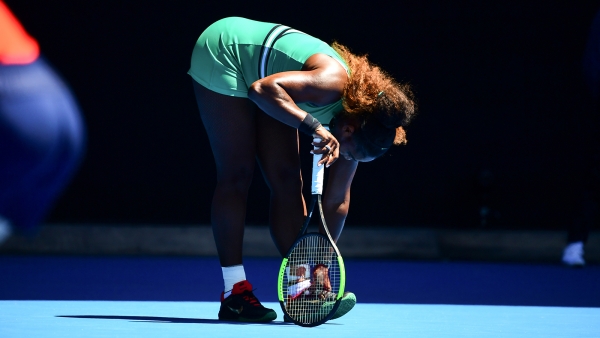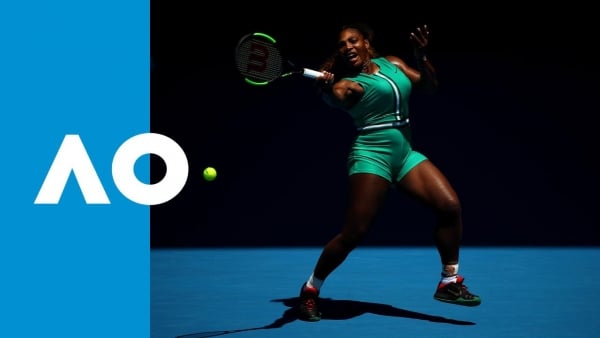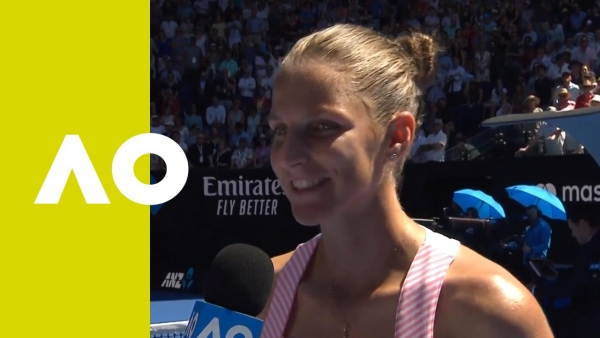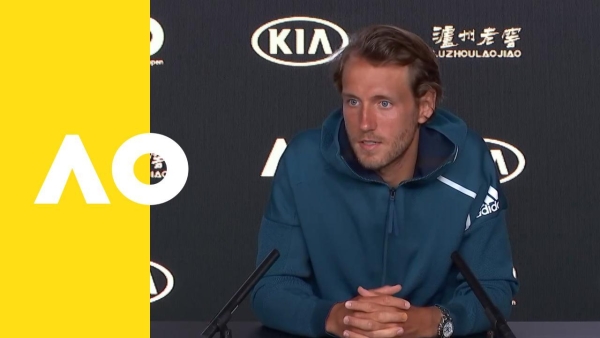1. We’ll have a new women’s champion
Naomi Osaka powered into her second straight Grand Slam semifinal first up on Wednesday, defeating battle-wearied No.6 seed Elina Svitolina 6-4 6-1. But Serena Williams won’t be joining her US Open conqueror for a rematch in the final four.
MORE: Osaka overpowers ailing Svitolina
Striving for a record 24th major title just 10 months into her return as a mother, Williams exited against Karolina Pliskova 6-4 4-6 7-5 in one of the most dramatic losses of her storied career.
MORE: Pliskova stuns Serena in quarterfinal upset
Coming from a set and a break down, Williams served for the win at 5-1 in the third, arrived at match point at 40-30, and went over on her left ankle as Pliskova hit a wrong-footing winner.
The 37-year-old Williams saw three more match points on the Pliskova serve at 5-4. But after saving the fourth and last of them, the power-hitting Czech ripped 10 straight points to arrive at 6-5 and hold three match points in a head-spinning turnaround. Williams saved the second with a backhand winner, but conceded the match with a netted forehand.
The seven-time champion’s defeat means the Australian Open will crown a new women’s winner.
Pliskova faces Osaka on Thursday, while the first semifinal sees Petra Kvitova, untouchable against Ash Barty, renew hostilities with Danielle Collins, after their three hour-plus battle of Brisbane.
Who would ever have picked No.35 Collins as the last American standing in a draw with Serena and Venus Williams, No.5 Sloane Stephens and No.17 Madison Keys?
2. Serena has never been more magnanimous in defeat
No one dared ask Serena if she had ever lost from 5-1 and four match points up. But no question the 23-time major winner was magnanimous in defeat following the dramatic upset.
“I think she just played lights out on match point, literally hitting lines,” the seven-time Melbourne champion evenly said. “She just played unbelievable on match point.
“There’s nothing I did wrong on those match points. I stayed aggressive. It’s not like I choked. She literally played her best tennis ever on those shots.”
MORE: ‘I did everything I could’: Serena
Serving for the match at 5-1, and 40-30, her first match point, Williams wrenched her left ankle while changing direction, and didn’t win another point on serve. Despite suggestions she couldn’t land without pain after serving, she refused to elaborate on the injury. “My ankle seems to be fine.”
Maybe Serena was overcompensating for her inglorious US Open final loss and its controversial aftermath. She is a cultural icon as much as a tennis great, and acutely aware of her place in history. Despite much prompting from the media, she has refused to revisit the Flushing Meadows chapter here, and her pronouncements have been more carefully worded than usual.
But if Serena was concerned at how she would be received by fans at her next Grand Slam, she didn’t have worried. The Aussie crowd saved its boos for their prime minister ...

3. The ice queen cometh
Pliskova’s team wore t-shirts emblazoned with ‘Ace Queen’.
‘Ice Queen’ would be just as fitting.
The notoriously superstitious Czech is riding a 10-match winning streak, which means sticking to her routines. Weirdest of them is climbing into the recovery ice bath with her entire team.
“But they haven’t played,” pointed out on-court interviewer Sam Smith, doubling as an occupational health and safety officer. “Yes, but they are more tired than me,” the 26-year-old countered.
MORE: Five things we learned on Day 9
A more positive omen for the angular power-hitter – finalist at the 2016 US Open and a former No.1 but seeking her first major – is firewalking through match points.
“I was almost in the locker room,” she noted, of braving four match points in two separate games for the comeback of the tournament. Echoes of Caroline Wozniacki’s “playing with house money” last year.
Recent champions Wozniacki, Angelique Kerber and Li Na all won the title after surviving match points in early rounds.
4. Lucas Pouille, gender-equality champion
Frenchman Lucas Pouille stunned No.16 seed Milos Raonic in four sets to make his maiden Grand Slam semifinal. In three previous meetings with the rocket-serving Canadian, 24-year-old Pouille hadn’t taken a set. He also turned around an abysmal 0-4 start to 2019, winless through the Hopman Cup and Sydney.
MORE: Pouille marches on as Raonic sent packing
It didn’t escape anyone’s attention that Pouille had Amelie Mauresmo, champion here in 2006, as his coach. Andy Murray famously recruited the Frenchwoman in 2014 when he was Wimbledon champion, defying the derision and sexism of his peers.
With Murray’s sadly imminent retirement, who among the men will take up the baton as a gender-equity champion? Pouille could well fit the bill.
“She has the right set of mind,” said the No.28 seed, also coached by former French player Loic Courteau. “She knows everything about tennis. It’s not about being a man or woman. You just have to know what you’re doing, and she does.”
5. History is on Novak’s side for No.7
Restored No.1 Novak Djokovic was always the man to beat at Melbourne Park. But after Wednesday night’s abbreviated quarterfinal – Kei Nishikori retiring at 6-1 4-1 down – the Serb is now overwhelming favourite for a record seventh Australian Open title.
MORE: Early night for Novak after Nishikori retires
“This is exactly what the doctor ordered,” Djokovic said, an unfortunate turn of phrase as his opponent limped from Rod Laver Arena, but true enough, following his attritional four-setter with his Monte Carlo practice partner Daniil Medvedev.
“I have the greatest memories from this court,” said Djokovic, referencing his breakthrough major here as a 20-year-old in 2008, the first year of the blue court.
Now a 14-time Grand Slam champion and arguably the best mover ever in men’s tennis, Djokovic also has history on his side as he takes on first-time major semifinalist Pouille on Friday night. Every time he has reached a semifinal here, Djokovic has gone on to win the title.


